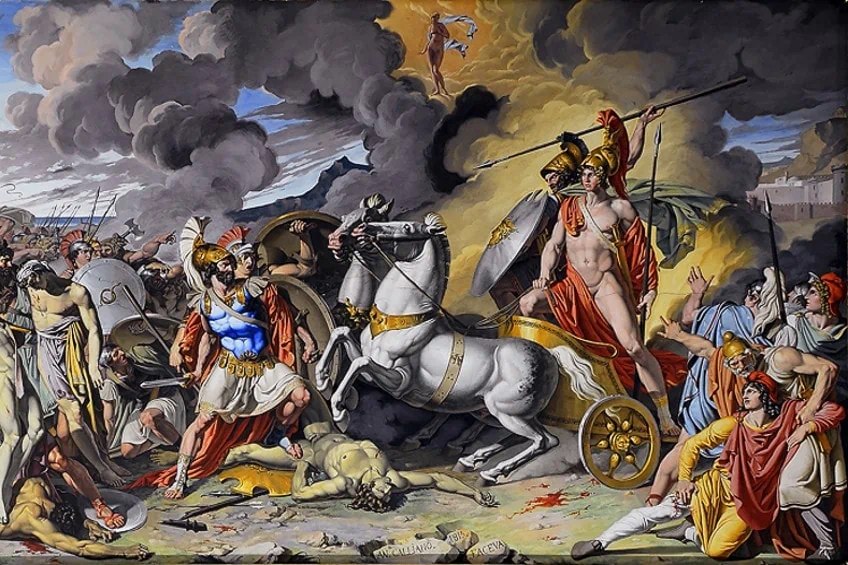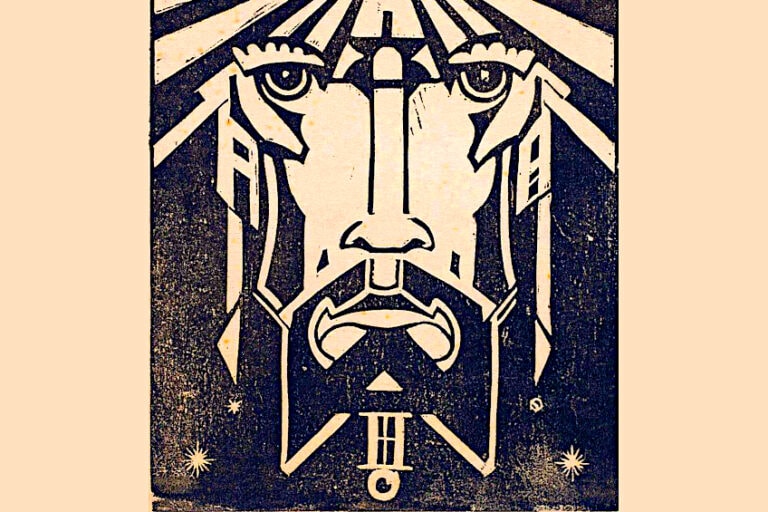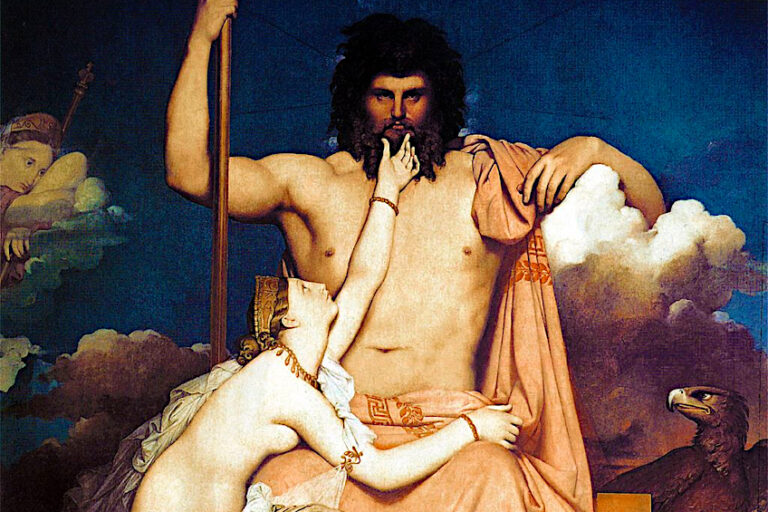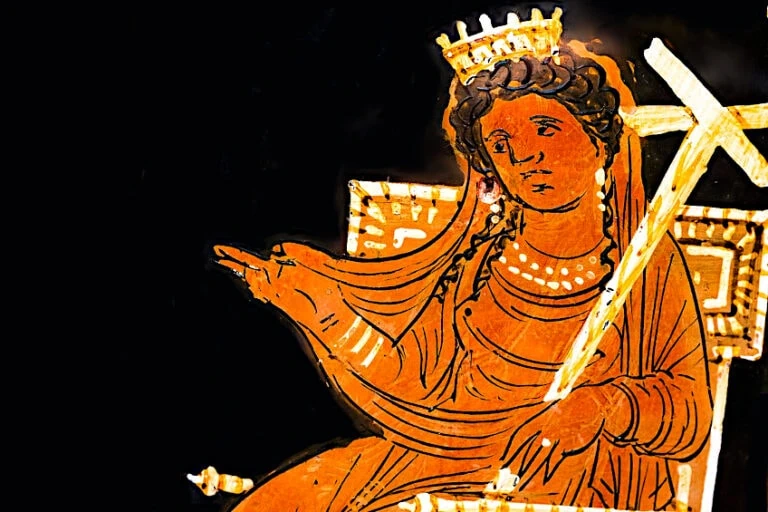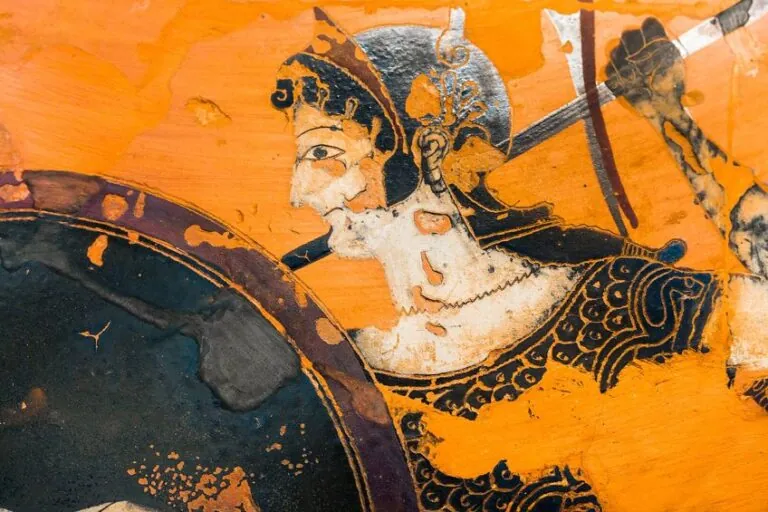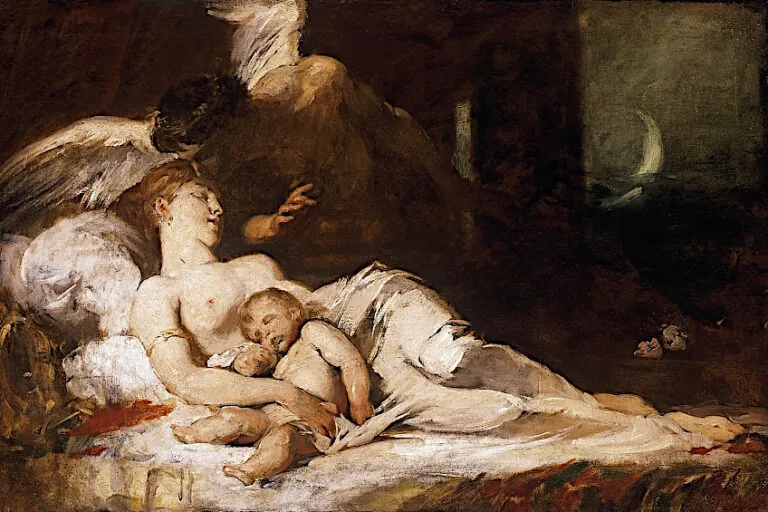Greek God Ares – Interesting Facts About Greek Mythology
What is Ares the God of and what is the symbol of Ares? In Greek mythology, the Greek God Ares is regarded as the god of war, as well as the god of courage. Ares’ defining symbol was a warrior’s helm, and even in intimate scenarios, such as gods’ feasts, he was shown wearing or holding onto his helm. Join us as we discover all of the Ares facts, such as the myths surrounding him, his domains of influence, and his significance in Greek mythology!
Understanding the Greek God Ares
| Name | Ares |
| Gender | Male |
| Symbols | Warrior’s helm |
| Personality | Untamed, violent, and courageous |
| Domains | War, chariot races, civil order, and pillaging |
| Parents | Zeus and Hera |
| Spouse | Unmarried |
The ancient Greeks were believed to be conflicted about Ares. In contrast to his armored sister, Athena, whose martial tasks include military planning and leadership, he epitomizes the physical heroism needed to achieve combat victory but can additionally personify raw savagery and bloodlust. Being associated with Ares imparts a violent, deadly, or military quality to objects, places, and other deities.
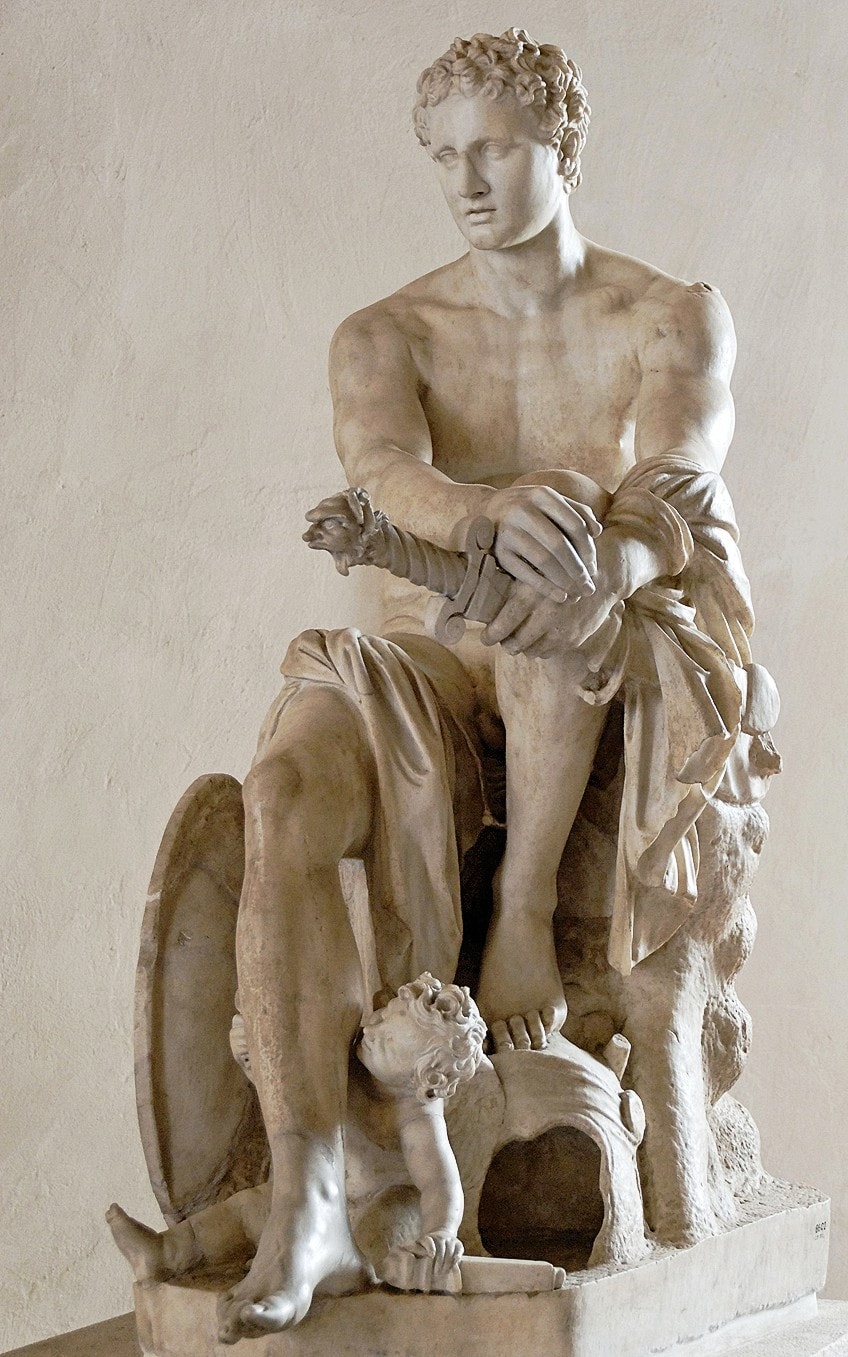 Marble statue of the Greek God Ares; Museo nazionale romano di palazzo Altemps, Public domain, via Wikimedia Commons
Marble statue of the Greek God Ares; Museo nazionale romano di palazzo Altemps, Public domain, via Wikimedia Commons
Origin and Role of Ares in Greek Mythology
Although Ares’ name indicates his Mycenaean origins, his standing as a symbol for savagery was interpreted by some to be indicative of his potentially Thracian origins. Annual ceremonies were organized in several places in Asia Minor and Greece to bind him as their protecting deity. He was regarded as an oracular god in areas of Asia Minor. Even further separated from Greece, the Scythians were believed to ritually slaughter one out of every 100 captives of battle as a gift to the Greek god Ares. The ensuing notion that ancient Spartans made human sacrifices to Ares may have been influenced more by prehistoric mythologies and misinterpretations than truth. Despite many literary references to Ares’ love relationships and progeny, he actually plays a minor part in Greek mythology. When Ares does make an appearance, he often gets humiliated.
During the Trojan War, Troy’s defender, Aphrodite, persuades Ares to join the Trojans. The Trojans are defeated, but Ares’ sister Athena supports the Greeks in their victory. When Hephaestus finds his wife Aphrodite has been having a love affair with the god of war, he catches them in a net and reveals them to the derision of the other Olympians.
The Greek God Ares’ Family
Ares was the son of Hera and Zeus, Queen, and King of the Gods, as well as the sister of the goddesses Hebe and Eileithyia. Aphrodite, Athena, Artemis, Apollon, Hermes, Dionysos, and Hephaistos were among his half-sisters and brothers. Ares had three offspring called Phobos, Deimos, and Harmonia with the goddess of love, Aphrodite. Semele, the daughter of Harmonia, was the deity Dionysos’ mother. Ares also had a large number of human offspring. Several of these had inherited Ares’ violent disposition and often ended up as villains in Greek mythology.
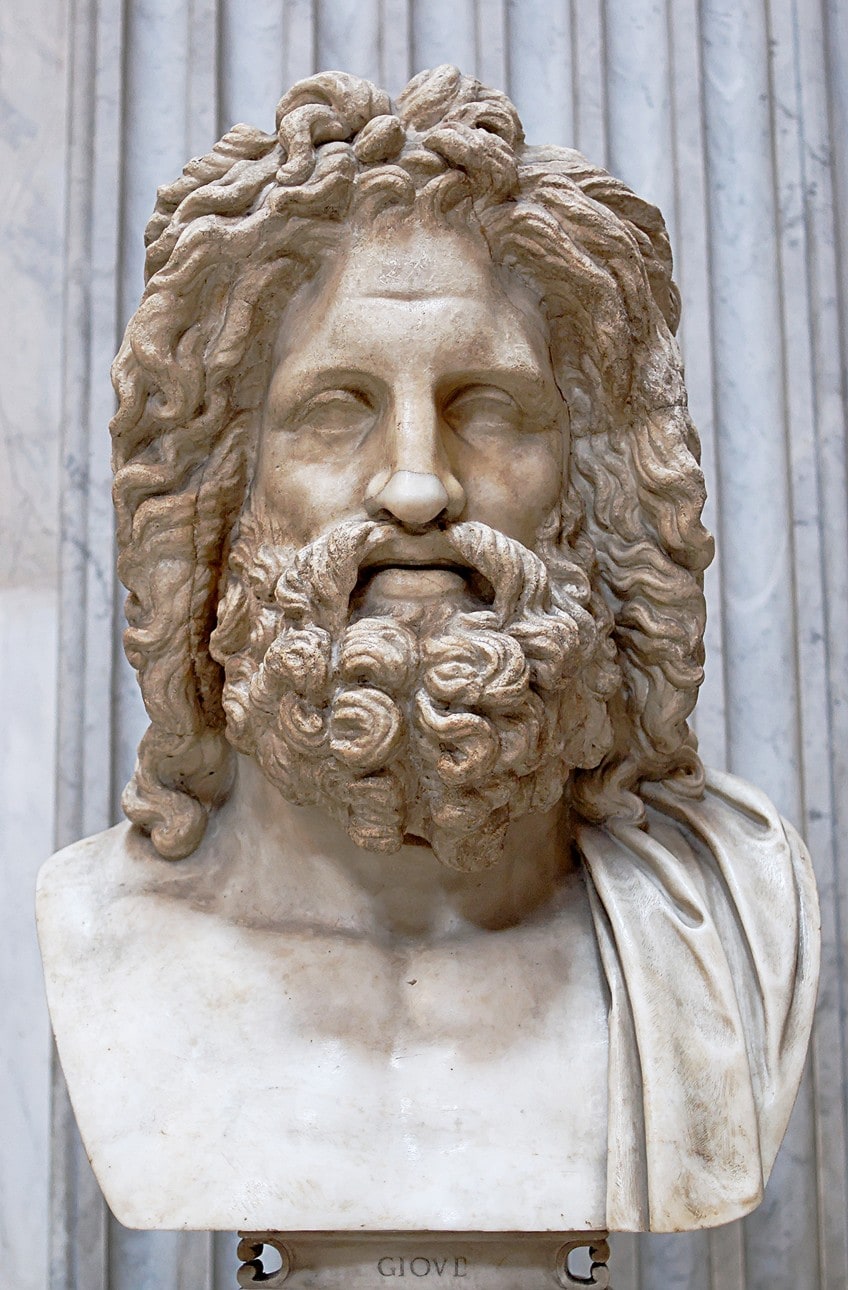 Marble statue of the Greek god Zeus; Vatican Museums, Public domain, via Wikimedia Commons
Marble statue of the Greek god Zeus; Vatican Museums, Public domain, via Wikimedia Commons
How Ares Differed in Character from His Siblings and Other Gods
The nature of Ares in Greek mythology is best understood by comparing it to that of other gods who are also associated with battle in some way. Athena represents planning and knowledge in wartime circumstances, and she defends humans and their homes from war’s ravages. Ares, though, is the personification of brute strength, as well as chaos, and other violent horrors. Ares enjoys the noise and fury of wars, the death of soldiers, and the devastation of villages, while his sister Eris is the god who brings war forth and Zeus controls its direction. He is not even swayed by party spirit, but rather helps one side or the other, depending on what he wants to do, or an impulsive whim. This god’s destructive influence was also thought to be at work in the destruction caused by epidemics and plagues. Ares’ fierce temperament makes him despised by his own parents as well as the other gods. In the Iliad, he is encircled by personifications of all the terrifying events and consequences of warfare; however, in the Odyssey, his demeanor is slightly softened.
It went against the Greek principles to depict an entity like Ares, with all his immense physical strength, as constantly triumphant; and when he comes into contact with higher forces, he is typically defeated. He was wounded by Diomedes, who was helped by Athena, and when he fell, he cried out like 10,000 soldiers at once.
The Influence of Ares’ Upbringing on His Character
While Ares’ parents and the other gods opposed his violent and war-like behavior, it is likely that much of his character was shaped by the environment in which he grew up. The Greek god Ares was born into the Olympian version of a dysfunctional family. His parents had a troubled marriage marred by adultery and deceit. Ares grew up seeing Zeus and Hera regularly quarreling and arguing, which would have had a significant impact on his emotional development. It’s probable he learned how to connect violence and abuse with authority and control, contributing to his subsequent portrayal as a violent and reckless deity.
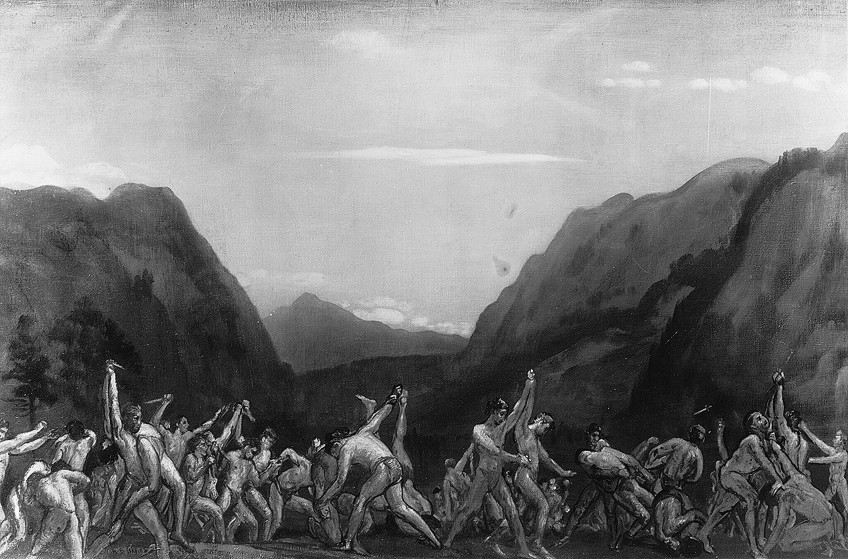 Girdle of Ares – painting by Arthur B. Davies; Arthur Bowen Davies, CC0, via Wikimedia Commons
Girdle of Ares – painting by Arthur B. Davies; Arthur Bowen Davies, CC0, via Wikimedia Commons
Ares lacked an adequate role model growing up. Zeus might have been a powerful god, but he was also notorious for his infidelity and neglect of the feelings of others, and Hera was usually depicted as envious and cruel. Ares grew up in a way of life that revered violence and conflict. Ares was no exception to all the other gods who also engaged in conflicts and wars in Greek mythology. He was respected for his bravery and authority on the battlefield, and his ability as a fighter was lauded. This upbringing may have fostered his notion that violence was an efficient way to solve challenges and achieve goals.
The God of War’s Role in Greek Mythology
Ares worship was not widely practiced in Greece. At Athens, he had a temple with an Alcamenes statue; in Laconia, there is a temple where an annual festival was held during which no women were permitted to go near the temple. He was also worshiped in Tegea, near Thebes, as well as in Sparta, where there existed an antique statue depicting the god in chains, indicating that the martial spirit and triumph would never leave Sparta. Ares was presented with human sacrifices in Sparta. We know of no artistic representation of Ares before the period of Alcamenes, who appears to have developed the idealized version of Ares. The numerous legends about Ares and his veneration in the nations to the north of Greece appear to suggest that his adoration originated from Thrace; and the whole personality of the god, as portrayed by the earliest Greek poets, appears to have been believed little suitable to be portrayed in their works of art.
The deity is mostly shown on reliefs, coins, and jewels; there aren’t many Greek structures left that show him. Romans connected the Greek Ares with their own god, Mars.
The Domains of Ares
Ares was a war deity who was invoked before wars and military operations. He was revered as the protector of warriors, and it was thought that his worshippers would triumph if he was present on the battlefield with them. Additionally, Ares was connected with aggression and violence. He had a reputation for being egotistical and easily agitated. Both mortals and gods dreaded him because of his love of killing and violence. Ares was typically portrayed as the characteristic Greek warrior, complete with chiseled features and an aggressive demeanor. In ancient Greece, he was revered as the epitome of manhood, and his worship was deeply associated with the concept of the “warrior code”.
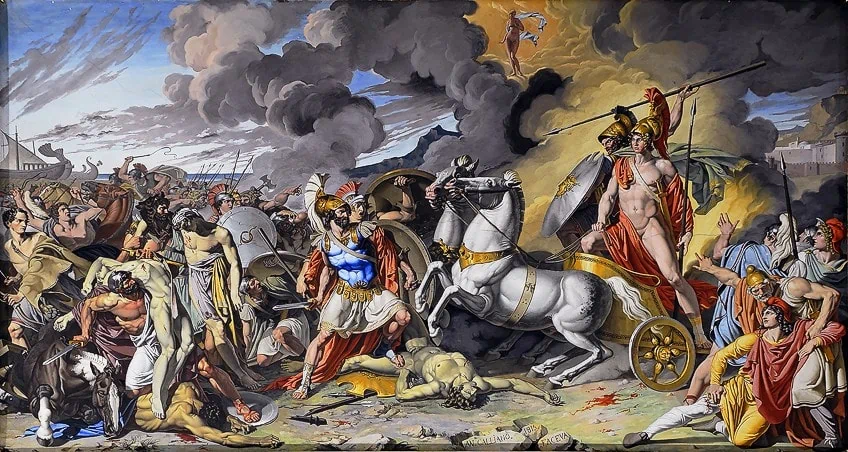 Antonio Raffaele Calliano created this painting, known as “Achilles in his chariot rides over the body of the slain Hector” for the throne room of the Royal Palace of Caserta; Antonio Raffaele Calliano, CC BY-SA 4.0, via Wikimedia Commons
Antonio Raffaele Calliano created this painting, known as “Achilles in his chariot rides over the body of the slain Hector” for the throne room of the Royal Palace of Caserta; Antonio Raffaele Calliano, CC BY-SA 4.0, via Wikimedia Commons
Ares was also linked to sexual desire. His lusty behavior was said to be a mirror of his aggressive and impulsive disposition. He was well known for his multiple relationships and connections with both mortals and gods. Ancient Greeks often sacrificed animals, and Ares was usually the receiver of their gifts. Bulls and other animals were offered up in his honor, and these rites were often carried out in his temples and shrines. Ares played a significant part in Greek mythology and made many appearances in legends and myths. His acts have often been portrayed as being careless and rash, with far-reaching effects on both mankind and other gods.
God of War Myths
Ares was a war deity who oversaw armies and battlefields. In a sense, he was also the deity of peace since, if appeased, he could prevent conflict. He was also the deity of the labors of war; he oversaw the organization of the army, the marching forward and rousing of the warriors, and the combat itself.
Ares and the Founding of Thebes
As the creator of the water dragon killed by Cadmus, Ares plays a crucial part in the creation myth of Thebes. The armored Spartoi sprang from the earth when the dragon’s teeth were planted there like a crop. In order to make amends for slaying the dragon, Cadmus spent eight years working for the deity. Cadmus wed Harmonia, an offspring of Ares and Aphrodite, in order to further placate Ares. In this manner, Cadmus put an end to all conflict and set the foundation for Thebes.
It came to rule Boeotia’s vast and productive plain, which in myth and history served as a battlefield for rival nations. Plutarch claims that the plain was once referred to as “The dancing floor of Ares”.
Ares and the Giants
In one ancient story, exclusively told by the goddess Dione to her daughter Aphrodite in the Iliad, two giants called Ephialtes and Otus, chained Ares in shackles and trapped him in a metal urn for a period of 13 months. “And this could have signified the end of Ares and his hunger for warfare, had the exquisite Eriboea, the stepmother of the young giants, not revealed to Hermes what they had carried out”, she recounted. The god of war was imprisoned in the urn, wailing and screaming, until Hermes liberated him, and Artemis confused the giants into killing each other.
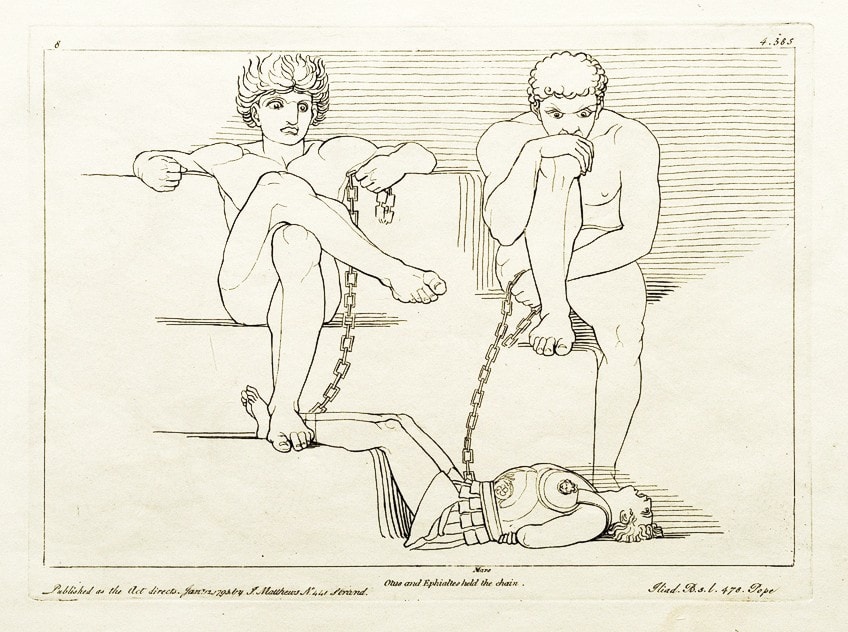 The two giants, Ephialtes and Otus chaining Ares in shackles; Foto H.-P.Haack, Public domain, via Wikimedia Commons
The two giants, Ephialtes and Otus chaining Ares in shackles; Foto H.-P.Haack, Public domain, via Wikimedia Commons
Illiad
Ares has not demonstrated any specific loyalty in Homer’s Iliad. He swears to Hera and Athena that he was going to fight for the Achaeans, but Aphrodite convinces him to join the Trojans. Diomedes fights Hector during the war and encounters Ares serving on the Trojan side. Diomedes orders his men to leave. Zeus authorizes Athene to expel Ares from the battlefield. Diomedes thrusts his spear towards Ares, urged by Athena and Hera. Ares’ cries cause all sides to quake as Athena pushes the spear home. Ares retreated to Mount Olympus, compelling the Trojans to retreat too. Ares learns that his son Ascalaphus has been murdered and decides to rejoin the Achaeans for revenge, ignoring Zeus’s decree that no Olympian should take part in the warfare. Athena intervenes and stops him.
When Zeus lets the gods fight again in the battle, Ares assaults Athena in order to take revenge for his previous injury. But, by hitting him with a boulder, Athena manages to overpower him.
Agrius and Oresius
Ares had a daughter named Thrassa who also gave birth to a daughter, Polyphonte. Thrassa’s daughter had been cursed by Aphrodite to fall in love with a bear, giving birth to two sons, Oreius and Agrius, who were contemptuous of the gods and ate their visitors. Zeus assigned Hermes to discipline them, and Hermes chopped off their limbs and feet. Ares restrained Hermes because Polyphonte originated from him, and the two brothers agreed to rather convert Polyphonte’s children into birds. Oreius was transformed into an eagle owl, Agrius was turned into a vulture, and Polyphonte into a strix; Polyphonte’s servant prayed not to be transformed into a bird of evil omen, and Hermes and Ares granted her wish by transforming her into a woodpecker, which is considered a good omen for hunters.
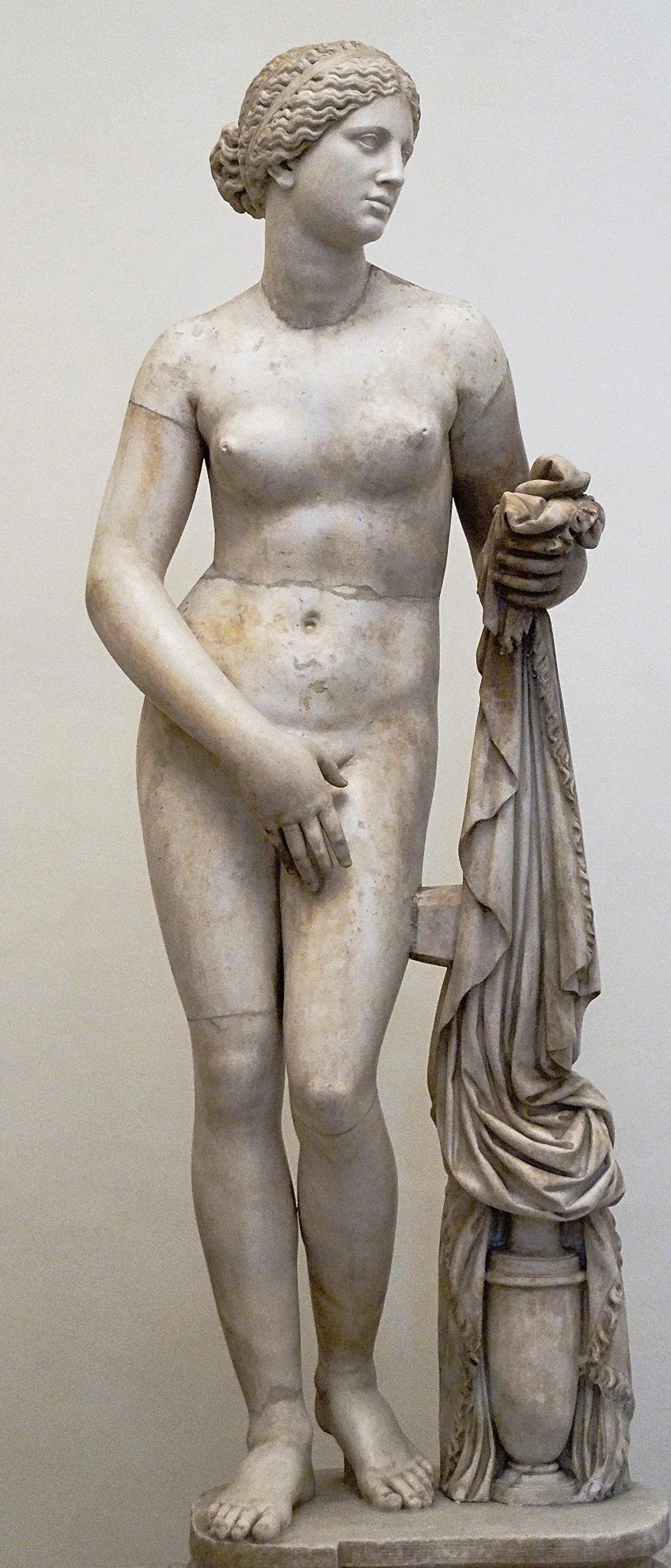 Image of the Greek goddess Aphrodite; Museo nazionale romano di palazzo Altemps, Public domain, via Wikimedia Commons
Image of the Greek goddess Aphrodite; Museo nazionale romano di palazzo Altemps, Public domain, via Wikimedia Commons
Ares and Aphrodite
The Sun god Helios once watched Aphrodite and Ares having sex surreptitiously in the hall of Hephaestus, her husband. Helios informed Hephaestus about what had happened. In order to capture the adulterous pair in the act, Hephaestus designed a meticulously woven and practically undetectable net. This net was thrown at the proper time, trapping the couple in a very intimate embrace. Hephaestus, however, was not happy with his vengeance and brought the Olympian gods and goddesses to observe the hapless couple. The goddesses declined out of humility, but the male deities went to observe the spectacle.
Some of the gods present remarked on Aphrodite’s beauty, while others said they would readily switch places with the god of war, but all who were in attendance mocked the couple. When they were freed, Ares went back to Thrace, while Aphrodite traveled to Paphos.
In a much later inserted detail, the Greek god Ares placed Alectryon, a young soldier, just outside of his door to alert them of Helios’s arrival, as they knew that Helios would inform Hephaestus of their infidelity if they were by any chance discovered, but the soldier ended up falling asleep while on duty. Helios spotted the two and informed Hephaestus. As a kind of retaliation, Ares transformed the sleeping soldier into a rooster, which now always declares the appearance of the sun in the morning to amend for not alerting them of the sun god.
The God of War’s Personality and Attributes
Ares’ most notable attribute was his peaked helm. Other attributes of the god of war were a spear, a shield, as well as a sheathed sword. Ancient artists did not utilize a special insignia for the deity, but rather a generic one from their usual repertoire, even if his shield was typically ornamented with some form of emblem. Ares typically wore a breastplate, a short tunic, a helm, and greaves to resemble a typical Greek warrior. He was occasionally represented naked, save for the cap and shield, and the breastplate was occasionally omitted in favor of a straightforward tunic. Due to the lack of characteristics that set Ares apart from other warrior figures in ancient Greek art, it can be challenging to recognize him. The snake served as Ares’ holy animal. He was also linked to several birds, namely a few owl species and the vulture, which according to ancient astrology were considered signs of war, rebellion, and bad luck.
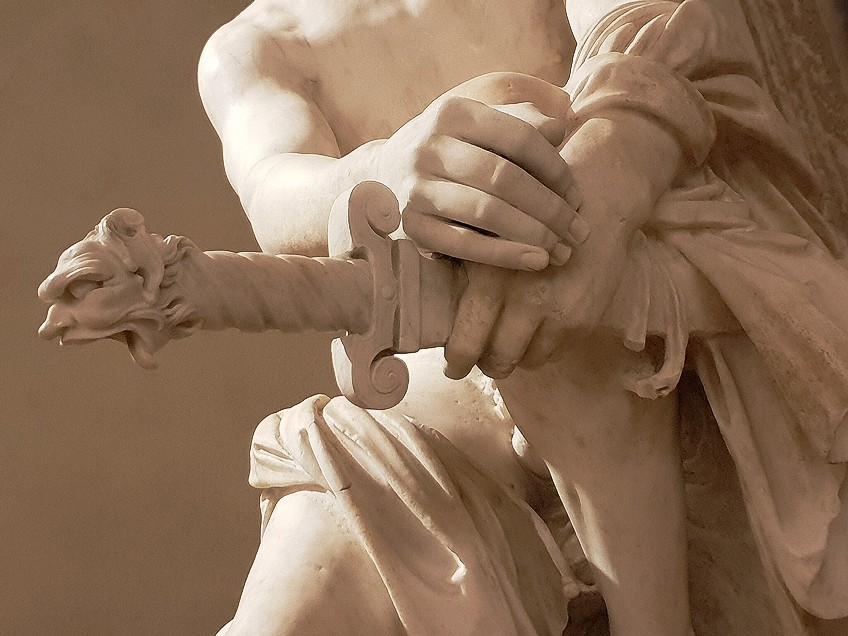 This sculpture portrays the god of war, Ares; MumblerJamie, CC BY-SA 2.0, via Wikimedia Commons
This sculpture portrays the god of war, Ares; MumblerJamie, CC BY-SA 2.0, via Wikimedia Commons
The Colchian Dragon, an animal sent by the Greek god Ares to protect the Golden Fleece, and the Ismenian Dragon, a huge snake that watched over the god’s holy spring outside of Thebes, were the two most well-known of the god of war’s creatures in myth. Ares is also linked to bravery, tenacity, and physical power in Greek mythology. He is presented as a powerful warrior with unrivaled strength and proficiency in combat. His position as the god of war where physical prowess and bravery are necessary for success, is reflected in these attributes. Ares’ interaction with women is another part of his character that can be observed in his role in Greek mythology. Ares was infamous for having several relationships, which led to friction and resentment. This aspect of his character can be seen in his function as a destroyer of familial and societal order, which is a recurring subject in Greek mythology.
Legacy and Impact of the Greek God Ares
The Greek God Ares left a significant impact on not only the ancient Greek era, but the following eras as well. His influence can be seen in in the Roman, Renaissance, and modern era. Let’s examine these a bit closer.
Impact on the Greeks
While Ares was revered and venerated as one of the 12 Olympian gods by the Greek people, he was not especially well-liked or popular. Ares, unlike the other Greek gods, had relatively few myths and tales written about him, and those that were, often described him as impetuous, hot-headed, and inclined to cause havoc and destruction. Ares’ effect on ancient Greek daily life was primarily restricted to the battlefield. Soldiers would offer prayers to him for success, and sacrifices would be made in his name prior to and following military engagements. Nevertheless, Ares was not regularly worshiped or called upon outside of the realm of war, and he did not have an integral role in the daily lives of most Greek citizens.
The ancient Greeks considered war to be a necessary evil that must be avoided wherever possible, rather than a beneficial or desired activity. As a consequence, while Ares was regarded as the god of war, he was not adored or worshiped in the same manner that other Olympians, such as Athena or Apollo were.
Impact on the Romans
Ares’ closest Roman god equivalent is Mars, the child of Jupiter and Juno who is preeminent among the Roman army’s warrior gods but was initially a god of agriculture. Mars was assigned a prominent and prestigious role in ancient Roman mythology as Romulus’ father, Rome’s fabled founder, was the protecting figure of the whole Roman state and its citizens. Under the influence of Greek tradition, Mars was linked with Ares, yet the two gods’ personalities and demeanor were vastly different. Mars was viewed as a figure who assured peace and as the Roman people’s father.
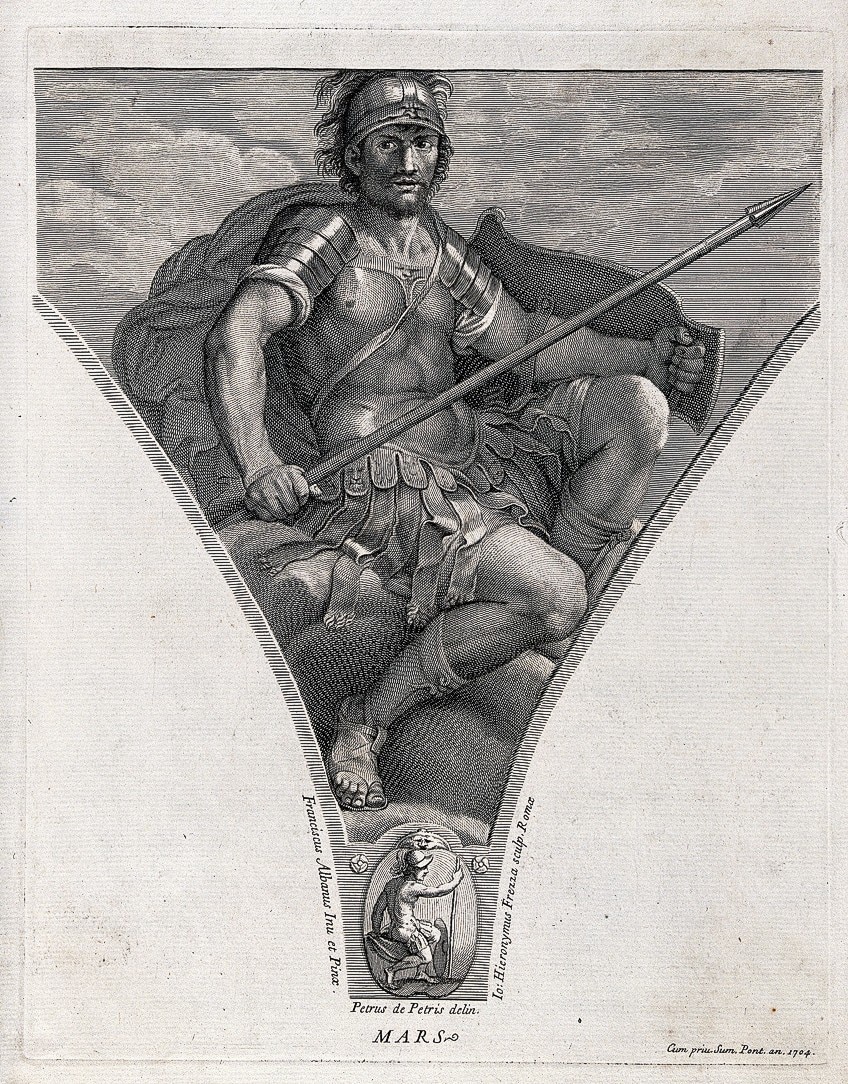 Mars (Ares). Engraving by G.H. Frezza, 1704; See page for author, CC BY 4.0, via Wikimedia Commons
Mars (Ares). Engraving by G.H. Frezza, 1704; See page for author, CC BY 4.0, via Wikimedia Commons
According to one legend, he fathered Remus and Romulus and Remus by ravishing Rhea Silvia. In another, the goddess Venus delivered Aeneas, the son of a Trojan king and fugitive who “founded” Rome a few centuries before Romulus. The stories of Ares were adapted by Roman authors as Mars during the Hellenization of Latin literature. Under Roman rule, Greek authors documented cult customs and ideologies relating to Mars under the name Ares. Thus, the ancient legends of the two figures became interchangeable in the tradition of Western art and literature.
Impact on the Renaissance Era
Ares/Mars was still connected with the theme of combat during the Renaissance era, although his image changed slightly. Ares/Mars grew to be associated with the values of bravery and honor in combat, rather than being represented simply as a destructive and disruptive force. This represented a shift in views regarding war, which became increasingly seen as a vital part of keeping the peace and protecting against foreign threats. Ares/Mars developed an association with the notion of masculinity in addition to having been associated with combat. Renaissance philosophers looked to Mars as an embodiment of male power and virility, drawing on ancient views about the roles of gender. This concept was mirrored in a variety of examples of art and literature from the time. Ares/Mars remained a prominent character in European culture and art after the Renaissance as well, notably throughout the period known as the Baroque.
Yet, as warfare evolved into a more mechanized process and less centered on hand-to-hand combat, Ares/Mars’ cultural significance faded. Throughout this time frame and into the modern era, many other cultures outside of Europe maintained their devotion to war gods.
In Japan, for instance, the god of battle was Hachiman, who was often portrayed as a celestial defender of the Japanese people. In Hinduism, the deity Kartikeya was identified with victory and conflict. Yet, in the ancient Greco-Roman period, these deities had quite distinct cultural contexts and significance compared to Ares/Mars.
Impact on the Modern Era
While Ares’ worship waned with the decreasing popularity of ancient Greek religion, his impact and influence continue to be seen in many facets of modern society. Ares’s persistent symbolism of war and strife has had a tremendous influence on the modern era. The word “Ares” is frequently used to allude to various military operations or battleships, and the symbol of Ares appears on a variety of military badges and insignia.
Art and Literature
Ares also has an effect on artistic and written works that examine themes of conflict, bloodshed, and human nature. In literature, for example, Ares is frequently depicted as a violent and rash person, in contrast to the more deliberate and focused approach of other Olympians such as Athena. This contrast has been addressed in a wide range of works of fiction and nonfiction, from ancient epics like the Iliad to modern books and films. Scholars of mythology and religion continue to study and analyze the mythologies of Ares, advancing our understanding of the historical and cultural environment in which he arose. Historians may obtain insights into ancient Greek views about battle and conflict, as well as wider social values and beliefs, by studying Ares’ myths.
The Lessons of the Greek God Ares
Because the Greek gods embodied many human traits, we can learn much about ourselves through their actions and interactions with one another. While we can strive to attain the positive aspects of the various gods, we can also learn what to avoid through their mistakes. Ares, as the notorious god of war, is obviously no exception to this rule, and we can learn much about our own short tempers and rash behavior by studying his stories and character. Ares is most typically depicted as being an extremely harsh and destructive character, emphasizing the devastation caused by war on human civilizations. Ares’ tales function as an illustration of the human cost of armed combat, as well as the long-lasting psychological and physical scars it may leave behind. Ares represents the darker, more primitive parts of the human psyche, such as aggressiveness, violence, and hotheadedness. He additionally symbolizes the strength, courage, and resolve seen in people who are prepared to battle for what they value. These complexities of our human nature are a major subject in many mystical myths, and it teaches us that humans are not easily classified as being either good or bad.
While Ares is regarded as a cruel individual, other deities such as Athena are thought to represent thinking strategically, control, and preparation. This contrast emphasizes the significance of these characteristics in obtaining success in battle, as well as in other aspects of life.
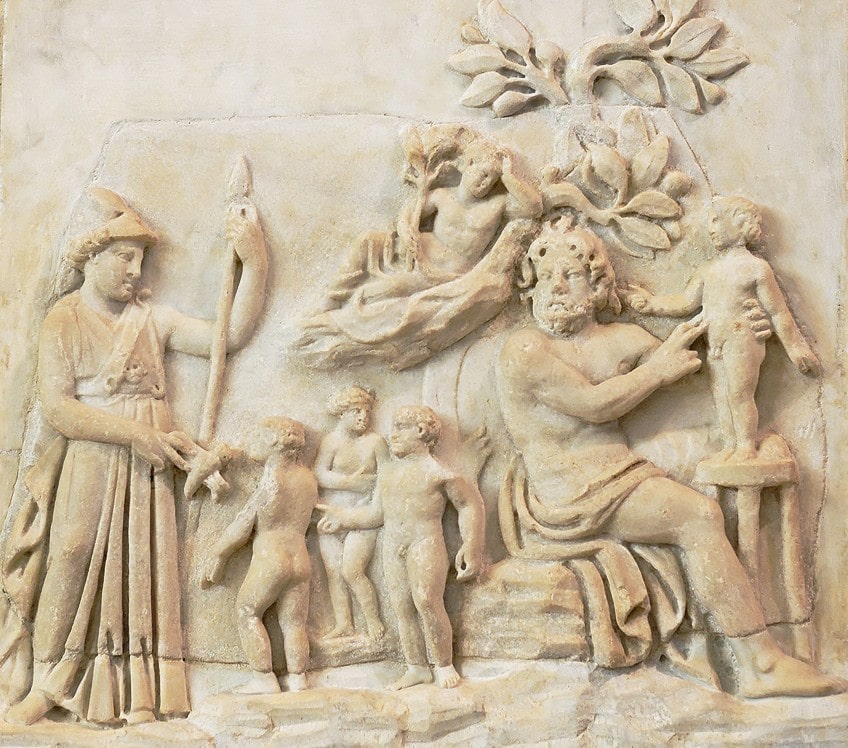 The creation of man by Prometheus. Marble relief, Italy, 3rd century CE; Louvre Museum, Public domain, via Wikimedia Commons
The creation of man by Prometheus. Marble relief, Italy, 3rd century CE; Louvre Museum, Public domain, via Wikimedia Commons
While Ares may be the official god of war, we can learn from the other gods that war and conflict need not be senseless and heated, but should also be carefully considered before climbing into battle head-first. While Ares is regarded as a cruel individual, other deities such as Athena are thought to represent thinking strategically, control, and preparation. This contrast emphasizes the significance of these characteristics in obtaining success in battle, as well as in other aspects of life. While Ares may be the official god of war, we can learn from the other gods that war and conflict need not be senseless and heated, but should also be carefully considered before climbing into battle head-first. The continuous study of Ares and other ancient mythological characters gives vital insights into the cultural and historical environment in which they developed. By conserving and researching these stories, we could gain a better knowledge of former civilizations’ beliefs, principles, and cultural customs, as well as obtain insight into their experiences.
Despite being regarded as anyone’s favorite Olympian, the Greek god Ares has been a prominent figure in mythology throughout time as a reflection of humanity’s ever-present lust for conflict and war. He is not only known for tearing towns and communities apart, but also tearing relationships apart, and his energy is as disruptive as it is destructive. But, as with all of the Greek gods, we can see our own actions reflected back to us through their stories, allowing us to see our own mistakes in their mythology. And with that, we conclude our look at the various Ares facts and fables!
Frequently Asked Questions
What Is Ares the God of in Greek Mythology?
Ares is primarily recognized as the god of war in the ancient mythology of Greece. The ancient citizens would call on him or pray to him whenever they were about to head into warfare, as well as after a battle. As the god of war, his most notable symbol and attribute is the warrior’s peaked helm.
Was Ares Influential in the Roman Era?
The Romans tended to adopt many of the Greek beliefs and associated their pantheons with each other. The Romans saw Ares as the Roman deity Mars. However, to the later Romans, he was not as hot-headed as Ares and was even called upon to bring peace in many situations. He continued to have some influence on the subsequent eras, such as the Renaissance and Baroque eras, and is still alluded to in the modern era today.

I am deeply passionate about history and am constantly fascinated by the rich and complex stories of the past. As the editor-in-chief of learning-history.com, I have the opportunity to share this passion with a wide audience through the creation and distribution of engaging and informative content about historical events, persons, and cultures. Whether it’s through writing articles and blog posts or creating videos or podcasts, I strive to bring the past to life in a way that is both accurate and enjoyable. My expertise in history, combined with my strong writing and communication skills, allows me to effectively communicate complex historical concepts and make them accessible and interesting to a wide range of readers. I am truly grateful for the opportunity to share my love of history with others through my work on learning-history.com.

